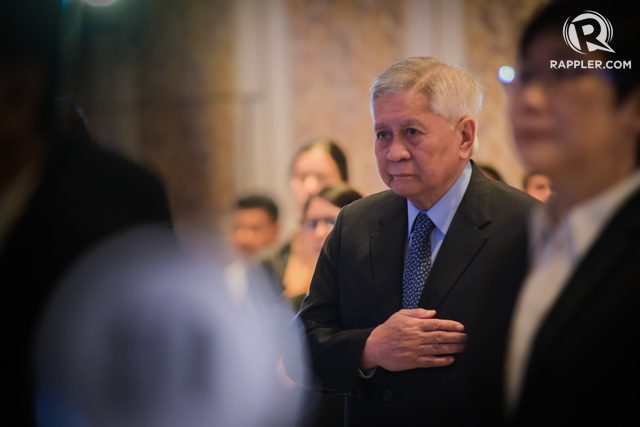SUMMARY
This is AI generated summarization, which may have errors. For context, always refer to the full article.

MANILA, Philippines – Former Philippine foreign secretary Albert del Rosario on Monday, October 28, said a South China Sea code of conduct (COC) must include the landmark 2016 Hague ruling to make sure the long-delayed sea code abides by the rule of law.
“The Hague Ruling on the Philippines’ case in the South China Sea should be an integral part of a binding Code of Conduct. Our region cannot promote the rule of law while ignoring the law as it stands,” Del Rosario said on Monday, October 28, during a speech at the ADR Stratbase forum on the South China Sea code.
Del Rosario’s comments come as leaders of Southeast Asian states are scheduled to meet for the 35th ASEAN summit in Thailand from October 31 to November 4. (READ: Carpio offers 5 ways ASEAN can counter Chinese intimidation in South China Sea)
Del Rosario, who was the Philippines’ foreign secretary when it decided to file its historic case against China, urged ASEAN states to exercise “utmost vigilance” in ensuring the COC is not used by China to undermine the arbitral ruling, which upheld provisions of the United Nations Convention on the Law of the Sea and invalidated China’s 9-dash line.
Del Rosario said the ruling, which upheld the Philippines’ rights in the West Philippine Sea, was now an “integral part of international law…which China is obligated to comply [with] as a State Party” to UNCLOS.
The COC is a set of protocols or guidelines that China and Southeast Asian countries with claims in the South China Sea will agree to follow to avoid any conflict in those waters. It builds upon the Declaration of the Conduct of Parties in the South China Sea signed by China and ASEAN states in 2002.
ASEAN leaders and China agreed to start talks on the COC in November 2017. Delays, however, have hampered the completion of the code nearly two decades since they agreed to set it up.
United front
Del Rosario likewise warned that the “rules-based and peacefully co-existent ASEAN architecture” was at risk due to “evolving geopolitical struggles” in the region, which included the tense situation in the South China Sea.
Without a binding COC, Del Rosario said China’s aggressive tactics in the maritime area will “persistently push the existing entitlements under international law of Brunei, Malaysia, Indonesia, the Philippines, Taiwan, and Vietnam into more turbulent waters.”
The South China Sea is now regarded as one of the most volatile maritime regions in the world, with experts warning maritime incidents could quickly escalate disputes among countries. Among ASEAN states with claims in the South China Sea, China has employed aggressive tactics. These have been seen in Malaysia, Vietnam, and the Philippines where Chinese coast guard vessels frequented the countries’ exclusive economic zones in recent months.
“The ASEAN should stress that the South China Sea is nobody’s backyard or exclusive preserve. Failure to do so would severely narrow ASEAN’s options and make it over-dependent on a single player,” he said.
Del Rosario urged ASEAN states to remain united and engage countries outside the region, such as China, the US, Japan, India, and Europe, among others, with the goal of urging them to engage with one another and “contain their rival ambitions in our region.”
“We must discourage them from dividing us; for ASEAN to have centrality, it must have solidarity,” he said.
President Rodrigo Duterte earlier raised the Hague ruling with Chinese President Xi Jinping during his recent visit to China in August 2019. (READ: When Duterte meets with Xi: What West PH Sea deals were reached in past talks?)
While this was marked difference from what he did during previous visits in the first years of his presidency, Xi merely reiterated China’s refusal to recognize the arbitral ruling which struck down their claim to the West Philippine Sea. – Rappler.com
Add a comment
How does this make you feel?
There are no comments yet. Add your comment to start the conversation.